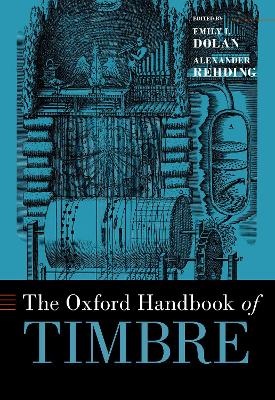OXFORD HANDBOOKS
1 total work
Despite its importance as a central feature of musical sounds, timbre has rarely stood in the limelight. First defined in the eighteenth century, denigrated during the nineteenth, the concept of timbre came into its own during the twentieth century and its fascination with synthesizers and electronic music-or so the story goes. But in fact, timbre cuts across all the boundaries that make up musical thought-combining scientific and artistic approaches to music,
material and philosophical aspects, and historical and theoretical perspectives. Timbre challenges us to fundamentally reorganize the way we think about music.
The twenty-five essays that make up this collection offer a variety of engagements with music from the perspective of timbre. The boundaries are set as broad as possible: from ancient Homeric sounds to contemporary sound installations, from birdsong to cochlear implants, from Tuvan overtone singing to the tv show The Voice, from violin mutes to Moog synthesizers. What unifies the essays across this vast diversity is the material starting point of the sounding object. This focus on the
listening experience is radical departure from the musical work that has traditionally dominated musical discourse since its academic inception in late-nineteenth-century Europe.
Timbre remains a slippery concept that has continuously demanded more, be it more precise vocabulary, a more systematic theory, or more rigorous analysis. Rooted in the psychology of listening, timbre consistently resists pinning complete down. This collection of essays provides an invitation for further engagement with the range of fascinating questions that timbre opens up.
material and philosophical aspects, and historical and theoretical perspectives. Timbre challenges us to fundamentally reorganize the way we think about music.
The twenty-five essays that make up this collection offer a variety of engagements with music from the perspective of timbre. The boundaries are set as broad as possible: from ancient Homeric sounds to contemporary sound installations, from birdsong to cochlear implants, from Tuvan overtone singing to the tv show The Voice, from violin mutes to Moog synthesizers. What unifies the essays across this vast diversity is the material starting point of the sounding object. This focus on the
listening experience is radical departure from the musical work that has traditionally dominated musical discourse since its academic inception in late-nineteenth-century Europe.
Timbre remains a slippery concept that has continuously demanded more, be it more precise vocabulary, a more systematic theory, or more rigorous analysis. Rooted in the psychology of listening, timbre consistently resists pinning complete down. This collection of essays provides an invitation for further engagement with the range of fascinating questions that timbre opens up.
